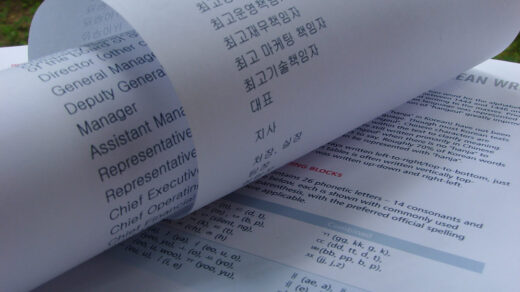Do you drink? If you do, that is certainly a plus for doing business in Korea because building relationships is important for doing business in Korea and drinking together is an important way for Koreans, particularly Korean men, to build and maintain relationships.
Heavy drinking is not uncommon and, as with public drunkenness, not frowned upon in Korea. People choosing to be teatotalers of their own free-will is not common. If you are a teatotaler, you will likely be asked why you don't drink and asked repeatedly by Koreans to have a drink even though you have told them you don't drink. Don't take offense at this; Koreans see drinking as a way to get close to people and are just expressing their desire to get close to you by sharing a drink. If you are determined not to drink, just decline calmly and politely each time your host asks.
Protestants in Korea are not permitted to drink or smoke, while there are no restrictions on drinking and smoking for Catholics. Quite a number of Protestants, however, do drink because they want to or because it is too hard for them to resist the pressure on them to drink from peers and work colleagues, given the importance placed on drinking in Korean culture. Protestants in America and other countries are permitted to drink alcohol while those in Korea are not. The reason for Korean Protestants not being allowed to drink is not found in the Bible but simply a rule made by early Protestant missionaries who were disturbed what that considered excessively heavy drinking by Koreans. If you say that you don't drink, then Koreans may assume that it is because you are a Protestant. Saying that you are a Protestant could be an easy way to explain why you don't want to drink. By the way, Protestant in Korean is "Christian" or "Ki-dok-yoh" and Catholic is "Catholic" or "Chon-joo-kyoh".
When drinking together, a Korean should never pour a drink from a bottle into his own glass and never allow another person in the group to pour his own drink. When someone else in the group has finished or almost finished his drink, one of the people in the group should top up his glass for him. If he has started pouring his own drink, he should be stopped and have it poured for him. You don't need to pour drinks for everyone in the group at all times, as other people will do it also, but try to keep an eye on the levels in people's glasses. When giving something to a person of similar or more senior level, you should always use two hands and this applies to pouring drinks also. Place two hands on the bottle or one hand on the bottle and one on your wrist. Koreans will generally not be offended when you don't follow their customs but will be impressed when you do. They may explain Korean drinking or other customs to you. They are not criticizing you, they just want to share their culture with you, so don't take offense.
The "hweh-shik", which translates as "company meal" is very common in Korea, but as eating out of an evening without drinking is uncommon, the meal usually involves a degree of drinking. The "hweh-shik" is more or less compulsory for employees of a company. People who never go or miss too many "hweh-shik" will find it hard to carry out their work and difficult to get promoted because a lot of company business is discussed at "hweh-shik" so the people who don't go will miss out on that vital information. In addition, as "hweh-shik" are bonding sessions, people who don't go will find it harder and harder to get along with others in the workplace. These days, the frequency of "hweh-shik" and the amount of alcohol consumed depend on the preference of the manager. If the manager doesn't enjoy "hweh-shik" then he won't hold them often and if he is not a heavy drinker, then there won't be any pressure on those present to drink heavily. However, the reverse also holds.
A "hweh-shik" often consists of a number of rounds i.e. visiting several locations in the one evening. Each round is called a "cha" and the Korean word for the numbers 1, 2, 3, 4, 5 etc. is placed in front of the word "cha" to indicate the number of the round. The first five rounds in ascending order are therefore, "il-cha", "ee-cha", "sum-cha", "sah-cha", "oh-cha". If you can get past the fifth round then you are a better man than I am! People are not necessarily obliged to stay until the very last round. Various members of the group will leave after each round. It is common to see people "fighting" to persuade someone to come on to the next round rather than going home. The first round usually starts out at a restaurant for a meal and some drinking and subsequent rounds consist of a series of other activities, which all usually involve drinking, and may involve the same activity at two different locations on the same night. These other activities commonly include going to a dedicated karaoke venue (nor-reh-bang in Korean), visiting a nightclub (nite in Korean) or disco (disco-tek in Korean) or going to a hostess bar (tahl-lahn-joo-jom in Korean).
Be aware that the price of alcohol at these post-first-round activities tends to be very expensive because these establishments have no or small entry fees and sell little else other than alcohol, so must make most of their profits from the sale of alcohol. Depending on the type and "quality" of the establishment, you can expect mark-ups of several hundred to several thousand percent, with particularly high mark-ups for whiskey.
It is quite likely that you will be invited to a "hweh-shik"-type meal by your Korean hosts and this could involve several additional "cha" or rounds. If you are invited then you would not be expected to pay any or all of the cost, but if you are the one doing the inviting, then you would be expected to pay all of the cost. Insisting that you do pay or contribute when you are not obligated to is seen as good manners. It is usual to offer several times and the host will naturally refuse each time. You may observe people who appear to be fighting as they are leaving a restaurant. There may be raised voices and some pushing. What you are probably witnessing is what I have just described above and involves making the symbolic effort that is so important in Korean culture.
It is uncommon for Koreans to drink without eating. Establishments that primarily sell alcohol also sell what is called "ahn-joo", which means "food to accompany alcohol". The group will usually order several different "ahn-joo" and share them, possibly ordering a number of times during the drinking session. "Ahn-joo" are like party food and are sold at reasonably but not highly inflated prices. "Ahn-joo" consists of things like shrimp crackers, fruit salad, chicken salad, noodle dishes and dried squid.



